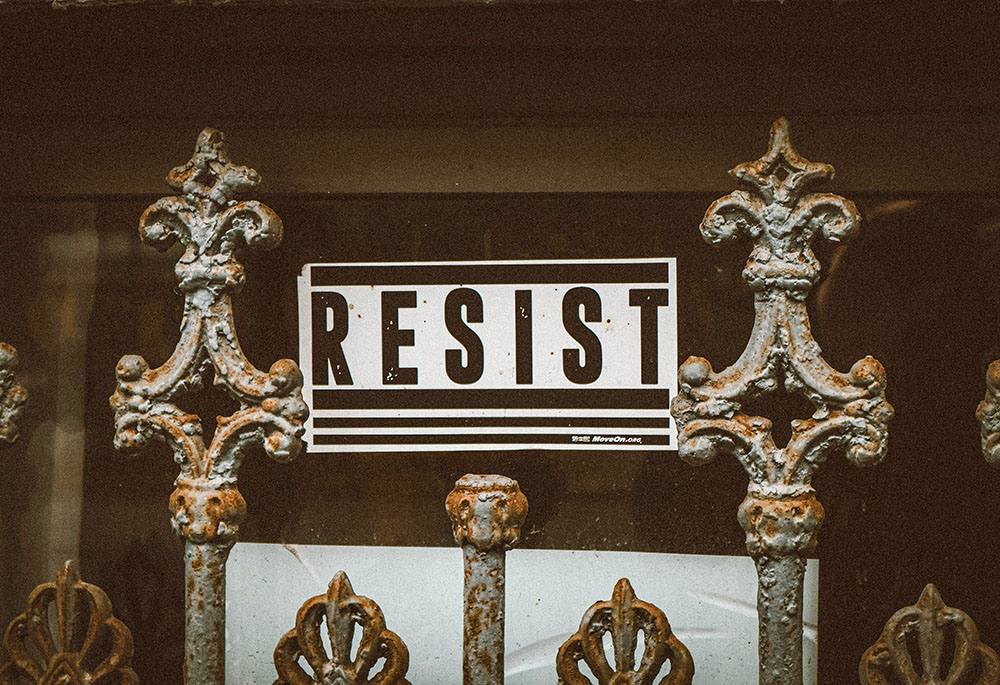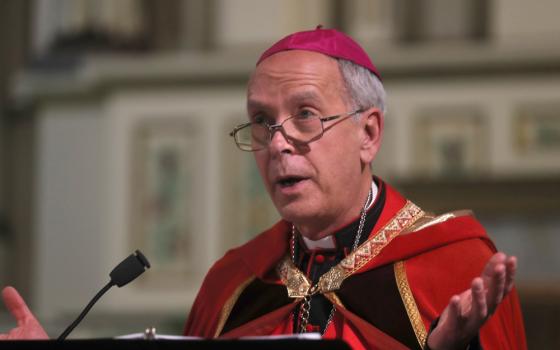
(Unsplash/Jon Tyson)
There is a well-known quote by the feminist educator, activist and poet Audre Lorde that appears in her 1988 essay collection A Burst of Light: "Caring for myself is not self-indulgence, it is self-preservation, and that is an act of political warfare." She wrote this within the context of her battle with cancer, but it has echoed through the decades as a powerful reminder to all people engaged in difficult and challenging work, especially the work of justice and peace.
I have been thinking about this quote a lot since Election Day last November. When commentators have observed the differences between the reaction to Donald Trump's 2016 victory and his return to power in 2024, it is Lorde's line that affirms the need for people of goodwill to ready themselves for the ultramarathon toward justice and peace that marks this moment and not the sprint that more than half the nation anticipated eight years ago.
No longer can we claim naivety or ignorance about what kinds of things might unfold in the months and years ahead. Because of this, a different kind of modality is required; a new approach to constructive resistance is needed. And care for oneself and one another will be essential.
Surely, there will be some readers who are not concerned about what will unfold in 2025, while others may even be happy to welcome a second Trump administration. But I also know there are plenty of people, of all political stripes, who are understandably and reasonably unsettled by the current state of national and global affairs.
I have been thinking about this latter group of people who are anxious and may wish to resist what they see as dehumanizing and unjust policies and practices by the incoming Trump administration, such as what has been telegraphed through initiatives like "Project 2025."
A new approach to constructive resistance is needed. And care for oneself and one another will be essential.
Keeping in mind the need to care for and pace oneself for the long haul, there are three areas of resistance that seem worthwhile and constructive.
The first is political resistance. This may seem the most obvious, but the practice of political resistance requires attending to the sometimes mundane and unglamorous dimensions of local civic engagement. Voting and activism are important, but they are often more impactful on regional politics than they can be at the statewide and national level.
For those who feel further disenfranchised by the results of the 2024 presidential election and the direction of public policy at the national or state levels, getting involved in your town, neighborhood or city is one way to effect positive change and recognizable outcomes. This may mean attending school board or city council meetings, or joining a faith-based advocacy group to help communicate the values and issues that are important to you within your community.
If the protection of the dignity, value and livelihoods of immigrants is important to you, work to make that a priority in your own backyard. If income equality or affordable housing is what matters to you, then connect with others to do something about it in your hometown.
There may be little that you can do to hold sway over the U.S. Congress's efforts to restrict legal avenues for migrants and refugees seeking safety and security in this country, but there is a lot that you can do for the family down the street or in your church community. That is a form of political resistance that is both constructive and reflective of the core of Christianity.
Another area is intellectual resistance. Given the extremely partisan and polarizing discourse in our society today, a phenomenon made all the more radical through social media echo chambers, it can be difficult to make sense of what is happening at any given moment. Avoiding the spin, even that which affirms your own perspective, while seeking facts and the truth, can be a form of resistance in the face of manifold actors seeking to manipulate and distract.
Advertisement
How one structures one's own thinking is key. It is difficult if not impossible to think clearly, intelligently and charitably if the source of one's information is driven by the emotional rollercoaster of social media or the 24-hour news cycle. Being deliberate about what information one takes in and what the source of that information is can be a practical and important form of intellectual resistance.
As I have recently shared, my own decision to leave the social media platform now known as X last year has been beneficial to me and a deliberate exercise in precisely this kind of sustainable resistance.
The last area is what we might call spiritual resistance. In an essay published in his 1968 book Faith and Violence, Thomas Merton describes a theology of love that is manifest as a "theology of resistance, a refusal of the evil that reduces a brother to homicidal desperation." For Merton, the spirituality that grounds an authentic theology of resistance always prioritizes nonviolence.
Violence takes many forms, including the obvious physical violence, but there are also forms of violence that are psychological, emotional and spiritual. Practices and policies that are inherently dehumanizing or discriminatory are forms of violence that must be resisted and, for Christians, requires a spiritual approach.
I am also reminded of the work of the late Christian activist and attorney William Stringfellow, whose writing and thought shaped many other Christian peace leaders during the middle and late 20th century. In his last book, The Politics of Spirituality, published just a year before his death, Stringfellow reflects on the ways the term "spirituality" is often misused in the American context. He shares that the term is too often invoked to justify forms of idolatry or as a form of religious jargon that is ultimately devoid of depth and meaning.
There are forms of spirituality that can rightfully be embraced as a form of resistance, especially if it is grounded in love and ordered to the in-breaking of God's reign as modeled by Jesus Christ.
However, over time, he came to believe that there is such a thing as genuine Christian spirituality that is about following Christ in the world while resisting becoming "of the world," as Jesus teaches in John 17:14-21. Spirituality, for Stringfellow, is about engaging in society in a manner following Jesus Christ.
He explains, "Spirituality, as far as I am given now to understand it, represents the ordinary experience of discerning and partaking in these politics."
Genuine spirituality in this case is the embrace of a politics of the kingdom of God, a biblically informed and guided way of being in the world modeled after Jesus. It is inherently a form of resistance to the unjust and non-peaceable politics of "the world." Stringfellow calls this spirituality "the most radical politics of all."
The lesson found in the reflections of Merton and Stringfellow is that there are forms of spirituality that can rightfully be embraced as a form of resistance, especially if it is grounded in love and ordered to the in-breaking of God's reign as modeled by Jesus Christ. Embracing a spirituality of resistance invites practices that we can cultivate to better heed St. Paul's exhortation: "Do not be conformed to this world but be transformed by the renewal of your mind" (Romans 12:2). That is to say, we ought to think, pray and act more like Christ.
No one knows exactly what will unfold in the coming weeks, months and years. But all indications suggest that the political and social polarization, the legitimate fear experienced by minority communities, and the violence we see in our world are not going away anytime soon.
To prepare ourselves for the political road ahead, we can engage in political, intellectual and spiritual resistance while also caring for ourselves and one another, as both a form of self-preservation and an "act of political warfare."







